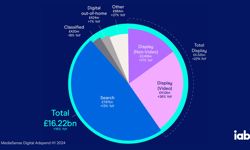
Q: Most media companies know they are up against the likes of Google and Facebook, which are making use of AI to develop and streamline products. However, many are unsure about how to approach AI. Will your discussion unpack these challenges and give some clarity on where to start doing this?
A: Data-driven media companies are the future. In an ideal world, top management would evaluate a holistic strategy of big data and AI for their media company, that is, the pervasive use of AI and data strategies throughout the entire value chain. Many companies already do this, such as the Financial Times and the Washington Post. That being said, this isn't an ideal world in the media business. Therefore, I would suggest starting small, racking up wins and growing AI and big data strategies organically.
A good place to start? That depends. It might depend on your company's talent and creativity. Perhaps a cross-department team of editorial, tech and advertising would like to create an AI-driven product. That finite product could be a relatively quick win for your company. For example, you could create a bot to automatically deliver news on a popular topic that your audience desires. You could create a new practice of distributing content on Amazon Echo and Google Home channels.
If you are willing to think bigger, your company absolutely must aggregate all of its audience data into one "data lake." This is costly and time consuming, but represents the first step to a proper data - and AI- driven strategy.
Without this, you cannot truly leverage the power of data and AI at your company. This should be the end game for every media company... sooner than later. After all, Google and Facebook leverage data to drive huge profits from their data-driven advertising practices. Together they own some half of all digital advertising worldwide. While it is unlikely to surpass them, media companies must be singing from the same song sheet. Advertising agencies and advertisers demand deep and rich data about your customers before doing business with you.
Q: You have said in the past that various forms of AI - language processing, analytics and machine learning - should be integrated into products and projects developed by media companies. Will you be focussing on any of these in particular, and if so, will you also be sharing some best practices and case studies? Can you name some of these that could be mentioned?
A: At this stage of our industry's early progress in the realm of big data and AI, it is absolutely necessary for companies to be inspired by the early adopters. I will talk about real projects going on around the world having to do with predictive analytics, natural language processing, and machine learning and basic audience analytics.
Q: Are there specific AI-powered tasks you will focus on to share with publishers? We know that personalised content seems to be the one everyone is talking about but what else?
A: Driving audience traffic and engagement are hallmarks of the big data and AI strategies. I will talk about some mini case studies that show the power of these strategies. Efficiencies are a by-product of leveraging natural language processing (NLP), that is, the automation of content plucked from databases without human intervention. These practices are popular especially in business and sports content because of the abundance of sports scores and financial data available in database format.
Q: What about voice bots? We’ve seen an upsurge in sales for smart speakers such as Echo and Google’s Home…
A: The development of Echo and Home content is becoming popular, but so far, there are no significant revenue models to speak of, as Google and Amazon own the distribution channels (again). Recommendation engines can be huge drivers of traffic, and a great strategy for "stickiness" or engagement of the user, which translates to dollars for ad viewing. Let's not forget predictive analytics, an essential tool to predict churn and to identify your best customers. These insights help us put our best customers, and indeed all of our customers, in the centre of our strategies.
Ultimately, this is the point of our data-first strategy. Data doesn't lie. Data holds us to account on our strategies and new product development. We can't (or shouldn't) make decisions based on our proverbial gut instinct about our audience. Rather, we should leverage our best asset - your data about our customers - to make scientifically informed decisions.
Q: Will you be sharing snapshots of the future? Just a couple of things Congress goers should be looking forward to hear about how the media/publishing landscape could change during the next decade…
A: Of course. Not all of it will be pretty. There will be winners and losers. The winners will be the media companies that leverage their owned audience data for traffic, engagement, subscription and advertising sales. The data strategy should be executed as a wholesale transformation in each magazine media company. I predict that those magazine media companies that don't develop a data practice will wither. Why? Because the audience will expect tailored, targeted and specialised content. This will require media companies to gather as much data as possible about your customers, and leverage the data to deliver the right content, on the right channels at the right time based on that knowledge. This practice will be de rigueur for the future. This promise from long ago is finally becoming a reality... powered by data and AI.
You can hear more from Martha Stone, Francesco Marconi (AP) and Alice Zimmerman (Google) as they discuss “AI and the media” at the 41st FIPP World Congress in London, 9-11 October. See full conference programme.
This article was first published on the FIPP website on 11 September.










